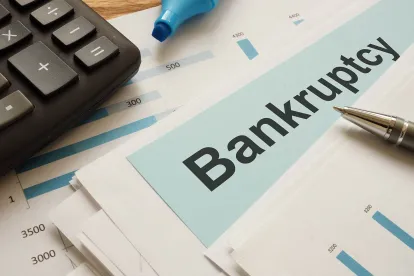The first half of 2023 witnessed the failure of three financial institutions in quick succession—Silicon Valley Bank (March 10, 2023), Signature Bank (March 12, 2023), and First Republic Bank (May 1, 2023). This was the first time three financial institutions failed in such a compressed time period since the Great Recession of 2008. The failure of Silicon Valley Bank (“SVB”) on March 10, 2023 ended a continuous 868 days with no bank failures, the second longest stint since 1933.[1] The collapse of these financial institutions and the ensuing bankruptcy filings of the applicable holding companies spotlight issues unique to banks, including the role of the Federal Deposit Insurance Corporation (“FDIC”) as receiver of the bank. Specifically, the pending chapter 11 case of SVB Financial Group (the “Debtor”), the parent company of SVB, has already touched on the FDIC’s right to tax refunds and the FDIC’s exemption from the seemingly straightforward obligation under sections 541 and 542 of the “Bankruptcy Code to turnover assets of the debtor’s estate. The question arises–are the issues arising in the SVB bankruptcy case a sign of things to come?
Tax Refund Redux
During the financial-institution failures resulting from the Great Recession of 2008, one of the key issues in any restructuring of a bank holding company was the ownership of tax refunds. The majority of failed financial institutions suffered significant losses giving rise to large tax refunds, which, in turn, led to disputes between the FDIC, as receiver for the failed banks, and the bank holding companies as to which entity was entitled to ownership of the refund. The disputes over tax refunds raged across the courts for several years and were expected to conclude with the Supreme Court decision in Rodriguez v. Fed. Dep. Ins. Corp., 140 S. Ct. 713 (2019). The Court in Rodriguez, however, never reached the substantive merits of the issue but, instead, held that the federal common law doctrine enunciated in In re Bod Richards Chrysler-Plymouth Corp., 473 F.2d 262 (9th Cir. 1973) was inapplicable to issues on property ownership, such as the tax refunds, which should be decided by applicable state law. Now, in the wake of the collapse of SVB, the question of ownership of tax refunds may be making a comeback.
On March 10, 2023, the California Department of Financial Protection and Innovation closed SVB and appointed the FDIC as receiver. As receiver, the FDIC has the right to all of the SVB’s rights, assets, powers and privileges. The FDIC transferred all deposits and substantially all assets of SVB to a newly created bridge bank, Silicon Valley Bridge Bank, National Association (the “Bridge Bank”). Thereafter, on March 17, 2023, the Debtor filed a voluntary petition for relief under chapter 11 of the Bankruptcy Code in the United States Bankruptcy Court for the Southern District of New York (the “Bankruptcy Court”).
Subsequently, the FDIC, as receiver for SVB, learned that tax refunds had been issued and were “nominally” payable to the Debtor. Instead of turning those checks over to the Debtor, the FDIC (or First Citizens Bank, which acquired the majority of the SVB’s assets) held those checks and filed a motion with the Bankruptcy Court seeking entry of an order establishing a tax escrow account where those funds could be held. The FDIC argued that the Debtor was not responsive to the FDIC’s requests for discussions on the tax refunds and, regardless, the tax refunds are owed to SVB or the Bridge Bank on account of the clear provisions of an inter-company tax allocation agreement entered into by SVB and the Debtor (the “Tax Allocation Agreement”).
The Debtor, along with the Official Committee of Unsecured Creditors and certain noteholders, immediately objected to the FDIC’s motion. These parties asserted numerous objections including that the FDIC violated the automatic stay by improperly withholding the tax refunds that were clearly payable to the Debtor and that the FDIC interfered with the delivery of mail.
The Bankruptcy Court held a hearing to consider these issues and, on May 17, 2023, entered an opinion and order denying the FDIC’s motions. See In re SVB Financial Group, 2023 WL 3521708 (Bankr. S.D.N.Y. May 17, 2023). In its opinion, the Bankruptcy Court acknowledged the existence of the Tax Allocation Agreement, which would govern determination of the ownership of the subject refunds; however, the court noted that the FDIC, while attempting to use that agreement to claim ownership of the refunds, “ignores the provisions of the Agreement that provides the process by which tax refund monies are to be distributed to the Bank.” See id. at *4. Indeed, under the Tax Allocation Agreement, the refunds are to be paid to the Debtor, as the tax payor, and the Debtor is then to allocate such funds as provided for under the agreement (likely to SVB). Instead of following this process, the court found that the FDIC is impermissibly seeking to “override” the terms of the Tax Allocation Agreement. See id. Rather, notwithstanding that the FDIC may ultimately be entitled to receipt of the tax refunds, the Debtor’s equitable interest in the assets remained, which makes the tax refunds property of the estate under section 541 of the Bankruptcy Code, and subject to turnover to the Debtor pursuant to section 542 of the Bankruptcy Code. Thus, while the determination of ownership of the tax refunds was not before the Bankruptcy Court, the process for determining ownership was. Therefore, the FDIC’s unilateral attempt to assert ownership was impermissible. See id. at *5. The Bankruptcy Court ordered the FDIC to turn over the tax refund checks immediately, but it did not find an intentional violation of the automatic stay. See id.
Deposits Dispute
Earlier in the case, the FDIC filed an objection to the often-routine motion by a debtor to continue using its existing cash management system. Generally, cash management motions seek authority to continue using existing cash management systems to avoid the time and expense of establishing new accounts upon the commencement of a bankruptcy case. Cash management motions are a staple of the plethora of “first day motions” filed at the commencement of a case to ensure a smooth entry into chapter 11 and, on most occasions, are granted with little resistance. Here, the cash management motion reveals that the Debtor maintained certain accounts, including its Operating Account, Regulation W Account, and SVB Capital Operating Account at the failed SVB, and that such accounts form part of a fully integrated cash management system. Without any discussion, the motion sought an order providing that “Bridge Bank . . . shall honor any transfer request made by the Debtor in order to move funds to a compliant Bank Account.”[2] By virtue of the FDIC’s appointment as receiver of SVB and the transfer of SVB’s assets, including deposits, to the Bridge Bank, any such accounts were under the FDIC’s control. Thus, the FDIC could use such accounts for distribution to the receivership’s creditors according to the priorities set forth in the Financial Institutions Reform, Recovery and Enforcement Act of 1989 (“FIRREA”), Pub. L. 101-73, 103 Stat. 183 (codified as amended in scattered sections of Title 12 of the United States Code.).
Accordingly, the FDIC objected to the cash management motion insofar as it sought to circumvent the FDIC’s statutory authority to administer assets held by SVB and distribute such assets to creditors. The FDIC’s objection explained that the relief sought in the cash management motion would effectively preclude the FDIC from fulfilling its statutory mission and permit the Debtor to circumvent the mandatory claims-allowance process under FIRREA. Moreover, the FDIC argued that allowing the Debtor to simply demand transfer of its accounts would extinguish the FDIC’s rights of setoff against any deposits maintained at the Bridge Bank.
On April 26, 2023, the Bankruptcy Court held a hearing to consider the cash management motion on a final basis and, on April 27, 2023, the court entered an order approving the relief sought.[3] The final order, however, excludes the language in the originally proposed form of order directing the Bridge Bank to honor the Debtor’s transfer requests. Following the entry of the final order, and per the Court’s instructions at the April 26 hearing, on May 3, 2023, the FDIC filed a statement “identifying specifically any Title 12 regulations on which the FDIC relies upon in exercising rights of setoff” (the “FDIC Statement”).[4] The FDIC Statement, among other things, makes clear that in transferring all of the SVB’s assets to the Bridge Bank, including the Debtor’s deposit accounts, the FDIC was not “sweeping” or holding the Debtor’s funds as an exercise of remedies against the Debtor. Instead, upon SVB’s failure, the FDIC is appointed as receiver and “assumes responsibility for efficiently maximizing the recovery from the disposition of the assets of the failed insured depository institution (“IDI”) and the resolution of claims in the receivership. The proceeds of the failed IDI’s assets are distributed to the receivership’s creditors, including depositors, according to priorities set by law.”[5]
Notwithstanding the clarification regarding the basis for transferring the assets to the Bridge Bank, the FDIC Statement goes on to list the FDIC’s various bases for setoff against the Debtor’s accounts, including (i) FDIC’s statutory right to the Bank’s assets under 12 U.S.C. § 1821(d)(2)(A)(i); (ii) FDIC’s common law right, as successor to SVB, to assert causes of action against its parent company, the Debtor; and (iii) a contractual right to setoff under the SVB’s Deposit Agreement and Disclosure Statement. As of the date the FDIC Statement was filed, the Debtor had not asserted a claim in the receivership claims allowance process on account of its Operating Account, Regulation W Account, and SVB Capital Operating Account or the deposits maintained therein.
Conclusion
These initial disputes between the FDIC and the Debtor over tax refunds and deposits are likely to signal the reignition of old battles for limited assets last fought during the Great Recession. While it may ultimately be determined that the tax refunds are property of SVB or that the FDIC can use the Debtor’s deposits as assets of SVB, the Bankruptcy Court’s orders are clear—regardless of the ultimate outcome, the bankruptcy process must be followed, and the Bankruptcy Court will not permit pre-determination of ownership over estate assets. Nevertheless, in the wake of continued economic uncertainty, one must ask the broader question—are these fights in the SVB case harbingers of issues to come or merely issues confined to the case’s unique circumstances? Only time will tell. We will continue monitoring the SVB case and the important bankruptcy issues implicated.
[1] https://www.fdic.gov/resources/resolutions/bank-failures/failed-bank-list/
[2] See Proposed Order, ¶ 7
[3] See Docket No. 132.
[4] See Docket No. 145.
[5] Id.





 />i
/>i

